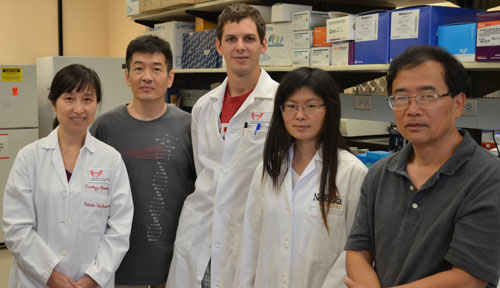It’s been almost 20 years since the landmark discovery of breast cancer (BRCA) genes 1 and 2, which first established that some breast cancer is inherited and can be passed down from generation to generation.
A finding by researchers at UNMC and Creighton University — published in the September/October issue of The Breast Journal — challenges current approaches in identifying breast cancer in families with a genetic link. The paper also might explain why, despite progress in the past two decades, identifying genetic connections for the majority of breast cancer that runs in families has been slow.
Tomorrow: The team’s research gives hope to a family ravaged by cancer.
There are an estimated 30 to 50 gene mutations identified that affect about 30 to 40 percent of women with familial breast cancer — with BRCA 1 and 2 being the most common.
DNA bank proves invaluable
Dr. Wang said advances in DNA technology and the DNA bank of Henry Lynch, M.D., of Creighton University, lent success to the project. Dr. Lynch has one of the nation’s best collections of DNA from familial cancer patients, which is used by researchers all over the world.
“Our registry’s unique focus on family — relationships, connected cancer diagnoses and biological samples — lends itself to discoveries such as this,” said Dr. Lynch, professor and chair of the Creighton University Department of Preventative Medicine and Public Health and director of the Hereditary Cancer Center at Creighton University Medical Center. “This is nowhere near the end of our collaboration in this field. We hope to apply this concept and method to other families in our registry, as well as other types of cancer.”
|
|
“So many people get breast cancer but we cannot find the cause for most of it,” said San Ming Wang, M.D., senior author of the article and associate professor in the UNMC Department of Genetics, Cell Biology and Anatomy. “Our study showed that many families have their own genetic factors that contribute to the disease. This finding goes against the existing theory, which has been that the same disease must have the same cause.
“People have been focused on finding a common mutation among different families. As many families have their own genetic causes, searching for a common cause will not work.”
San Ming Wang, M.D.
|
“But our data shows that the same disease can have different causes. People have been focused on finding a common mutation among different families. As many families have their own genetic causes, searching for a common cause will not work. This can explain why after almost 20 years, we haven’t made significant progress.”
The research team sequenced all 20,000 or so genes in each of the eight members of a family with five women affected by breast cancer in three generations. They discovered the family has the mutated gene KAT6B — known to be associated with many types of cancer, but not before associated with breast cancer, Dr. Wang said.
He said they tested the same gene mutation in 40 other families with familial breast cancer but didn’t see mutations in those families. Since publishing the study, the team analyzed 30 more families with familial breast cancer consistent with the study results.
“Our data shows it’s very likely that many families have different mutations, which directly supports our concept of same disease, different causes,” Dr. Wang said.
jeKFl
Very interesting and extremely important work! Great article!